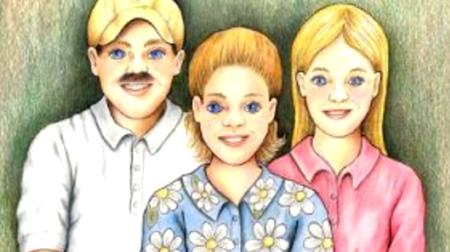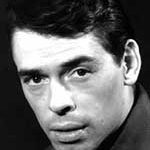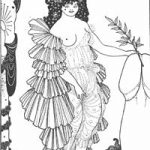
This is a detail from the new children’s book, My Parents Open Carry. You may well have heard about it because it is making quite the splash. It tells the story of 13-year-old Brenna Strong and her open carry parents as they go about their day with loaded guns strapped to them. Everyone knows the true sign of civilization is being armed because you can’t trust anyone! The book fills a gaping hole in children’s literature. I have never, for example, seen a book about a child whose parents were so paranoid and politically belligerent that they needed to walk around with loaded guns on display. So I think it is excellent that this book is out. Now we need to have a book about the parents of serial killers. There are just so many holes in children’s literature. Stupid Obama administration!
I haven’t read the whole book—only as much as I was allowed to on Amazon. And that means just the first page. But based upon that, it is a dull affair. We learn that young Brenna is “dreaming dreams only a 13 year old girl would dream.” How evocative! With that little description, we know exactly who Brenna is: a stock 13-year-old girl from, How to Write a Children’s Book Children Will Hate. But that’s fine, because it’s pretty clear this book is not written for children. It is a political exercise—intended to get publicity for the open carry movement.
Need more evidence? The book opens with this sentence, “The Strong family consists of Richard Strong, his wife Bea and their 13 year old daughter, Brenna.” Note the traditional hierarchy. We know who’s in charge and we know the last name of “wife Bea.” But more than this, what children’s fiction writer decides to start a book ostensibly about Brenna by describing the family structure? After getting the hierarchy straight, the writers tell us where the family lives: modest home; medium sized town; Midwest. This is a far more un-threatening milieu than John Fitzgerald’s 1967 classic The Great Brain, set in 1890s Utah.
After we learn about generic Brenna dreaming her generic dream in her generic house in her generic hometown, her equally generic mother (Of course!) comes in and wakes her generically with, “Brenna, come on sweetheart, we have lots to do today. We have errands to run, people to see, and places to go!” Note the awkward use of the rule of three: “places to go” is implied in the others. It’s boring writing from beginning to end.
Let’s see if I can improve upon it:
Bam!
Brenna shot up in bed. Her mother had shot a bullet into her daughter’s headboard. This was usually how her mother woke her on weekends. “Brenna, come on sweetheart,” her mother said. “We have lots to do today. We have errands to run, people to see, and places to go!” Brenna sighed to herself. No good luck charm after all.
Okay, so it’s not even good. But sadly, it is infinitely better than the three paragraph long insipid snor-fest that Brian Jeffs and Nathan Nephew provided us. Apparently their only qualification for writing this book is that they are the co-founders of Michigan Open Carry. But maybe that’s as it should be, because again, the purpose of the book is political and not, as the authors claimed, to create “an open carry adventure.” But that usage is interesting. Apparently, in the open carry community, an “adventure” is just getting through one day without accidentally shooting anyone.
One thing I’m especially interested in is that cover. The illustrator, Lorna Bergman, is competent, I suppose. But she is certainly not very interesting or inspired. It does, however, have the advantage of matching the prose. Be that as it may, what I’m struck with are the characters. Mother and daughter have blond hair and blue eyes. Father has light brown hair and blue eyes. It strikes me as awfully Aryan. And note: as far as I can tell, both of the writers have brown eyes. But the characters are also skinny and the writers are, well, a bit on the chunky side.
The whole thing is quite successful in one way: conservatives are whipping out their wallets and buying this book big time. But there’s nothing especially new about that. Conservatives have been supporting mediocre writers for decades. Now they’ve switched to supporting non-writers. And this book really will support the “open carry” cause, because all of that money is going to be funneled to Michigan Open Carry.
I am so jealous! I wish that I were a conservative so I could make a lot of money without the obligation of having to demonstrate any talent or hard work.






Funny, I wasn’t familiar with the title. When I saw it I didn’t think it referred to children sipping on the NRA’s Kool-Aid, but rather the parent’s relationship status.
First rule for a good children’s book; it has to engage the imaginations of kids who are mad at their parents, but who ultimately depend on the security those parents provide. So the kid protagonist has to be raised by aunts/uncles, or parents who turn out not to be the real parents, allowing the reader to fantasize about escaping their home life without actually imagining existence as an orphan. If Harry Potter lived in the American foster-care system his life would be way too realistically depressing.
To make this a really good kids’ book (not, as you note, the real objective) the girl should live with a wimpy liberal family that is always terrorized by criminals and incapable of defending themselves. Then experience what life is like when guns solve everything.
I wonder if it’s possible to fake this shit. William Burroughs once wrote that he wished he could pen a self-help bestseller, but those bestsellers were usually produced by people who actually believed the swill they were writing. There’s a kind of hideous integrity to those things
@Paulie Wog – Hey! This is family-friendly blog!
@JMF – There is something to what you are saying. But I provided a great counter example. [i]The Great Brain[/i] series was wonderful without this. But my favorite of the books is when he’s away at the academy, so there’s that.
I think all genre writers start out earnest. If they are successful, they quickly figure out what they are doing. That’s fiction and nonfiction. I’ve gotten a lot of anger coming from fans of Jonathan Kellerman, who is one of the novelist I attack with glee. He was undoubtedly very good when he started. But by the 15th novel, he was just phoning it in. The same can be said to some extent of Stephen King, but he is such an amazing talent and he is so passionate, that I don’t think the argument is that strong.
Regardless, these guys aren’t writers at all. And it angers me that they don’t have to be. It does occur to me that maybe I should try some children’s fiction. In my first novel, the best stuff I wrote was about the adventures of these young paternal twins. And my screenplays are pitched at about that level. But I’m still intimidated by the children’s books I still love that were written by actual artists. So I probably won’t even try. There’s too much else to do anyway.